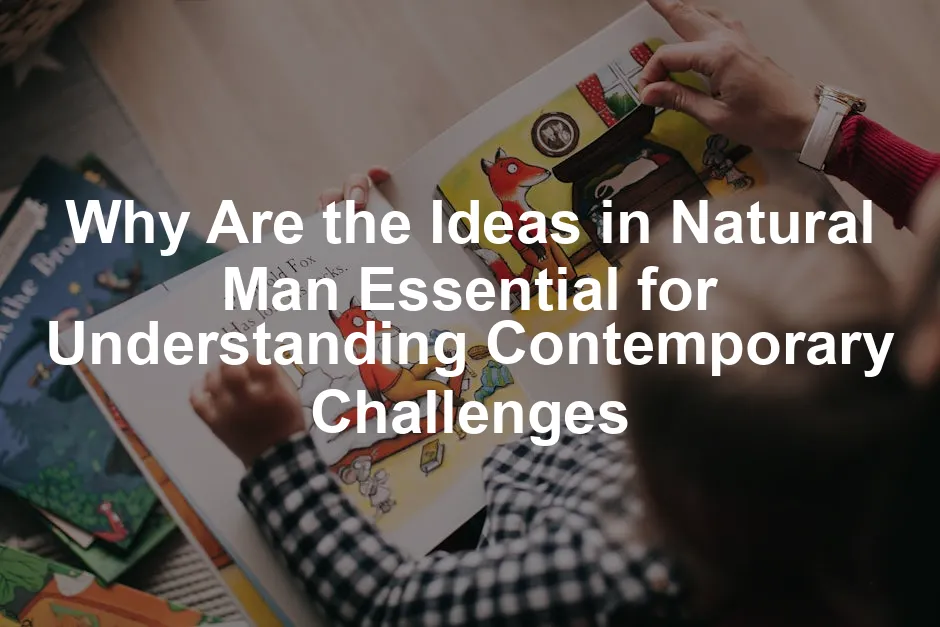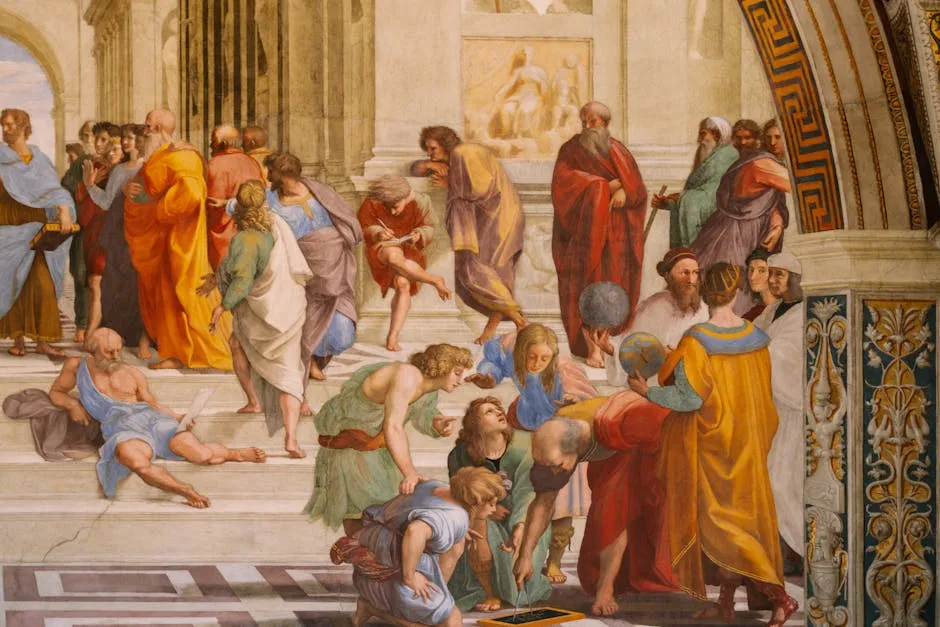
Why Are the Ideas in Natural Man Essential for Understanding Contemporary Challenges
Introduction
Jean-Jacques Rousseau, an influential philosopher, introduced the concept of “natural man.” This idea emphasizes that humans are inherently good but become corrupted by society. Rousseau’s insights offer valuable perspectives on today’s pressing issues, such as inequality and environmental crises. Let’s discuss how his thoughts can illuminate our understanding of these modern challenges.
Speaking of illuminating our understanding, let’s not forget the importance of a good reading environment! A comfortable office chair can transform your reading sessions into a cozy retreat, allowing you to dive deep into Rousseau’s fascinating works without the discomfort of an old chair. Who wouldn’t want that?

Summary and Overview
Rousseau’s philosophy revolves around the concept of natural man, who exists in a state of innocence and goodness. He argued that human behavior is shaped by both natural instincts and artificial societal influences. This dichotomy highlights how modern civilization fosters inequalities and environmental harm. For example, the rise of property ownership has led to moral and political inequalities. Rousseau’s views also resonate with contemporary concerns about social justice and ecological sustainability. By understanding these dynamics, we can better address issues like wealth disparity, climate change, and the quest for social equity.
To keep you hydrated while pondering these deep thoughts, how about a reusable water bottle? Staying hydrated is essential for clear thinking, and you’ll be doing your part for the environment too!

Rousseau’s perspective on natural man is crucial for understanding modern lifestyles. Learn more about its importance.
The Philosophical Foundations of Natural Man
Rousseau’s View of Human Nature
Rousseau believed humans are born good, but society corrupts them. He claimed that in a natural state, people act from compassion and empathy. This contrasts sharply with the competitive nature fostered by civilization. He distinguished between natural and moral inequalities, noting that the former is determined by nature, while the latter arises from societal structures.
In essence, moral inequality stems from artificial conventions, such as wealth and status. This insight is crucial for understanding today’s social divides. By recognizing how society shapes our values and behaviors, we can challenge the structures that perpetuate inequality. Rousseau’s perspective encourages a reevaluation of our priorities and a return to the principles of equity and compassion in addressing contemporary issues.

If you’re looking for ways to nurture your creativity while reflecting on Rousseau’s ideas, consider picking up a set of art supplies. Engaging in creative expression can help you explore and internalize philosophical concepts in a fun and meaningful way!
The State of Nature vs. Civil Society
Rousseau painted the state of nature as a serene existence. In this natural setting, humans lived simply and harmoniously. They were guided by their instincts and lived without the chaos of societal rules. This peaceful life allowed people to connect with their true selves. In contrast, civilized society introduced conflict and competition.
As communities formed, greed and inequality emerged. Individuals began to prioritize personal gain over collective well-being. This shift led to social unrest and moral corruption. Rousseau believed that civilization, while offering progress, often came at a steep price. Understanding this tension helps us see the roots of modern challenges. Today, many feel overwhelmed by societal pressures and inequality. Rousseau’s insights remind us of the value of simplicity and connection in our lives.

And speaking of simplicity, how about creating a relaxing space to unwind? An essential hammock can provide the perfect spot for you to reflect on Rousseau’s ideas while enjoying the great outdoors!
Contemporary Relevance of Rousseau’s Ideas
Societal Inequality and Class Struggles
Rousseau’s ideas about inequality are strikingly relevant today. He argued that the rise of property ownership created vast economic divides. This notion resonates with current social movements demanding justice and equity. In the United States, for instance, the wealth gap has widened dramatically. A recent study revealed that the top 1% now holds more wealth than the bottom 90% combined. Such disparities fuel protests and calls for systemic change.
Social mobility has also stagnated, making it hard for individuals to improve their circumstances. Many feel trapped in a cycle of poverty. Rousseau’s assertion that moral inequality stems from societal structures highlights this issue. Modern movements challenge these structures, advocating for fair wages and equal opportunities. They seek to dismantle the barriers that perpetuate inequity. By reflecting on Rousseau’s thoughts, we gain a clearer perspective on today’s class struggles. His work encourages us to push for a society where compassion and equity triumph over greed and selfishness.

To enhance your understanding of these societal issues, consider diving into a good book! For instance, “The Social Contract” by Jean-Jacques Rousseau is a foundational text that can provide further insight into these themes.
Environmental Challenges and the Human-Nature Relationship
Rousseau criticized commercial society for its destructive impact on the environment. He believed that capitalism fosters a disconnect between humans and nature. This idea is crucial as we face pressing environmental challenges today. Current statistics reveal alarming trends. For instance, the World Wildlife Fund reported that wildlife populations have declined by nearly 70% since 1970. Such loss threatens biodiversity and the planet’s health.
Sustainability efforts are gaining traction, yet many still prioritize profit over preservation. Rousseau’s critique serves as a reminder of our responsibility to nurture the earth. By aligning our societal values with environmental stewardship, we can create a sustainable future. Initiatives promoting renewable energy and conservation echo Rousseau’s vision of balance. They highlight the need to respect our natural surroundings. Understanding Rousseau’s perspective on commercialism can inspire us to advocate for a more harmonious relationship with nature.

In addition, how about sprucing up your home with some greenery? A houseplant can not only enhance the aesthetics of your space but also contribute to better air quality, reminding us of our connection to nature.
The Role of Education in Shaping Values
Rousseau’s educational philosophy emphasizes nurturing a child’s natural goodness. He believed education should be rooted in experience rather than rote learning. This idea is significant in today’s educational systems, where standardized testing often overshadows personal growth.
Rousseau argued that children are inherently innocent and should be guided to discover their true selves. By fostering an environment that encourages curiosity and creativity, we can help children develop empathy and compassion. This approach is vital in combating the moral decline often seen in contemporary society. When educators focus on holistic development, they instill values that counteract societal pressures. Ultimately, Rousseau’s insights remind us that education should prioritize character development alongside academic achievement.

And while we’re on the topic of education, why not invest in some highlighters for studying? They make it easier to emphasize key points in your readings, especially when diving into Rousseau’s complex ideas!
The Impact of Technology on Human Nature
Technological advancements have transformed our daily lives, creating artificial needs and altering human interactions. While technology connects us, it often leads to superficial relationships. Many feel isolated despite being constantly online. This disconnect is alarming, especially when considering the rise in mental health issues.
Statistics show a concerning trend: anxiety and depression rates have surged among young people. A survey by the Pew Research Center found that 61% of teens feel overwhelmed by the pressures of social media. This environment fosters unrealistic expectations and comparisons, leading to feelings of inadequacy. Parents and educators must address these challenges by promoting digital literacy and healthy online habits.
Rousseau’s critique of commercial society also applies here. He warned that our reliance on technology could overshadow our natural instincts and compassion. To combat this, we should encourage face-to-face interactions and outdoor activities. By doing so, we cultivate a more authentic connection with ourselves and others. Understanding the impact of technology on human nature is crucial for navigating contemporary challenges effectively.

Critiques and Limitations of Rousseau’s Philosophy
Idealism vs. Realism
Critics often challenge Rousseau’s idealistic views on human nature and society. They argue that his belief in the inherent goodness of humans overlooks darker aspects of human behavior. For instance, some suggest that civilization is not merely a corrupting force but a necessary structure for order and progress.
Modern realities further complicate Rousseau’s assumptions. In an age of globalization, cultural clashes and inequalities reflect the complexities of contemporary life. The rise of individualism can lead to selfishness, contradicting Rousseau’s vision of collective goodness. This divergence prompts us to question whether his ideals can coexist with the realities of today’s society.
Rousseau’s philosophy offers valuable insights, but we must balance idealism with realism. By acknowledging the multifaceted nature of human behavior, we can better address contemporary challenges while honoring Rousseau’s legacy.

The Dichotomy of Nature and Culture
The divide between nature and culture often sparks debate. Critics argue this separation oversimplifies human behavior. It suggests that we can fully understand ourselves without considering cultural influences. However, many cultures see this divide differently. They view nature and culture as intertwined, shaping human experience together.
For instance, Indigenous communities often emphasize harmony with nature. Their beliefs highlight that humans are part of a larger ecosystem. This perspective contrasts sharply with Western views, where nature is often seen as separate or even a commodity. Such differing viewpoints affect how societies address challenges like environmental degradation and social justice.
Understanding these cultural differences is crucial. It helps us grasp why certain societies prioritize sustainability while others may exploit natural resources. By examining this dichotomy, we can better address contemporary issues. It encourages a more holistic approach to understanding human behavior, one that acknowledges our deep connection to both nature and culture.

Conclusion
Rousseau’s ideas remain vital in addressing today’s challenges. His philosophy encourages us to reflect critically on our society, education, and relationships. By revisiting these concepts, we can better understand the roots of inequality and environmental issues. Rousseau prompts us to seek balance and authenticity in our lives.
Consider how these insights could apply to your everyday choices. Engaging with Rousseau’s thoughts could inspire personal growth and societal change. And while you’re at it, why not enjoy a good audiobook? A subscription to an audiobook service can give you access to a wealth of knowledge while you relax!

FAQs
What is the concept of natural man according to Rousseau?
Rousseau’s concept of natural man refers to an inherent goodness in humans. He believed that society corrupts this natural state. Understanding this idea helps us explore human nature’s complexities and societal influences.
How do Rousseau’s ideas apply to modern social issues?
Rousseau’s insights remain strikingly relevant today. Consider the growing wealth gap. Recent studies show the top 1% possess more wealth than the bottom 90%. This mirrors Rousseau’s concern about property ownership fostering inequality. Social movements worldwide echo his thoughts. Activists advocate for fair wages and equal opportunities, striving to dismantle barriers that perpetuate injustice. These efforts aim to create a society where compassion triumphs over greed. Rousseau’s philosophy encourages us to reflect on how societal structures shape our values and actions.
What are the criticisms of Rousseau’s view on human nature?
Critics often question Rousseau’s idealistic portrayal of humanity. They argue that his belief in the inherent goodness of people overlooks darker aspects of human behavior. Some contend that civilization is not solely a corrupting force but is essential for order and progress. This perspective raises important implications. Modern societies face challenges that Rousseau’s views may not fully address. For instance, the rise of individualism can lead to selfishness, contradicting his vision of collective goodness. Critics suggest that while Rousseau’s ideas inspire, they may also oversimplify complex social dynamics. By engaging with these critiques, we can better understand the multifaceted nature of human behavior. Balancing his idealism with realism is key to addressing contemporary issues while honoring Rousseau’s legacy.
How can Rousseau’s ideas inform our approach to education today?
Rousseau’s educational philosophy offers valuable insights for modern teaching. He advocated for nurturing a child’s natural goodness through experiential learning. This approach contrasts sharply with today’s emphasis on standardized testing. In Rousseau’s view, education should encourage curiosity and creativity. By fostering an environment where children can explore, we cultivate empathy and compassion. This is increasingly vital as society grapples with moral decline. Many educators today strive to implement holistic practices. They focus on character development alongside academic achievement. This alignment with Rousseau’s principles can lead to more meaningful educational experiences. By prioritizing personal growth, we can help children become engaged, compassionate individuals.
Why is Rousseau’s philosophy important for environmental discussions?
Rousseau’s critique of commercial society directly connects to today’s environmental crises. He argued that capitalism fosters a disconnect between humans and nature. This perspective is crucial as we face alarming trends in biodiversity loss and climate change. Current statistics reveal a dire situation. Wildlife populations have plummeted significantly over recent decades. Efforts to promote sustainability often clash with profit-driven motives. Rousseau’s insights remind us of our duty to nurture the earth. By aligning societal values with environmental stewardship, we can create a more sustainable future. Initiatives focusing on conservation and renewable energy echo Rousseau’s vision of balance. Understanding his philosophy can inspire us to advocate for a more harmonious relationship with nature.
Please let us know what you think about our content by leaving a comment down below!
Thank you for reading till here 🙂
All images from Pexels




